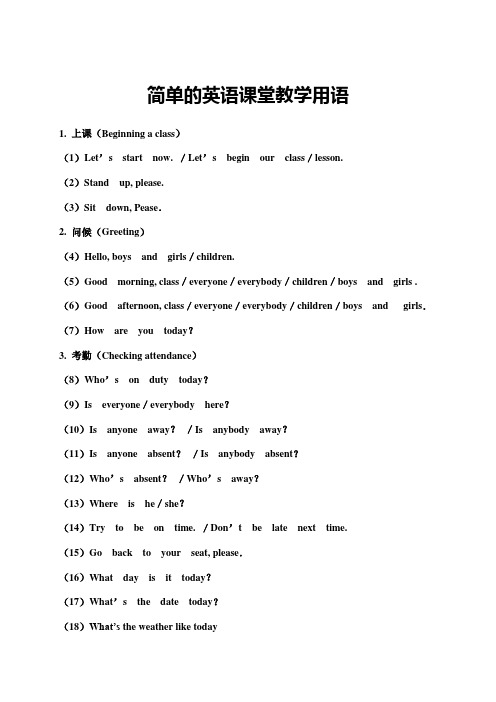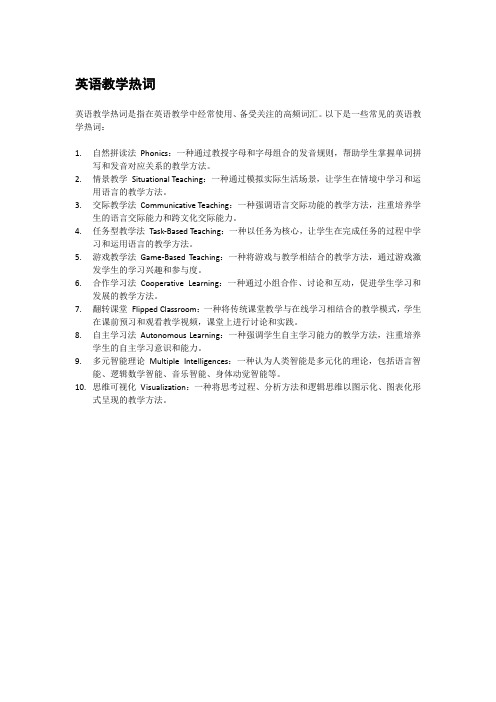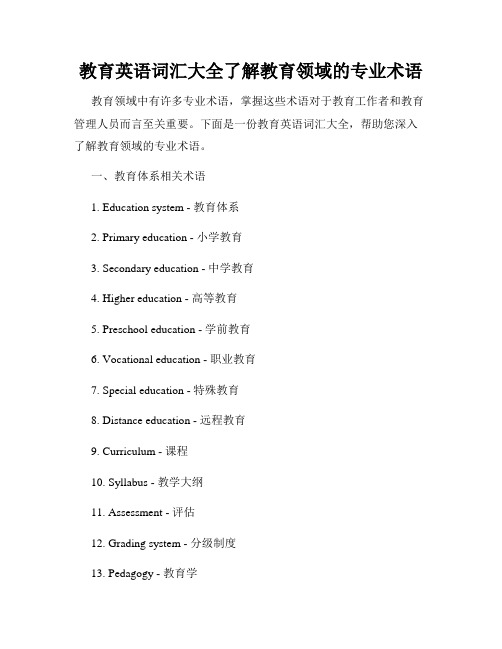初中英语教学专业术语
初中英语专业术语

陈述句declarative sentence一般疑问句General Questions特殊疑问句Special Questions疑问词interrogative (word)感叹句exclamation sentence祈使句imperative sentence1、主语从句subject clause引导词conjunction2、表语从句predicative clause系动词link verb3、宾语从句object clause4、状语从句adverbial clause时间状语从句adverbial clause of time地点状语从句adverbial clause of place原因状语从句adverbial clause of cause条件状语从句adverbial clause of condition目的状语从句adverbial clause of purpose让步状语从句adverbial clause of concession比较状语从句adverbial clause of comparison程度状语从句adverbial clause of degree结果状语从句adverbial clause of result方式状语从句adverbial clause of manner4、定语从句attributive clause语法句法词法结构层次词类syntax grammar morphology structure ran part of speech实词虚词专有名词普通名词notional word structrural word proper noun common noun抽象名词具体名词物质名词集体名词abstract noun concrete moun material noun collective noun个体名词连词主动词系动词助动词individual noun conjunction main verb link verb auxiliary verb情态动词短语动词限定动词非限定动词使役动词modal verb phrasal verb finite verb infinite verb causative verb感官动词动态动词静态动词感叹词方式副词verb of senses event verb state verb exclamation adverb of manner程度副词时间副词地点副词修饰性副词adverb of degree adverb of time adverb of place adjunct连接性副词疑问副词关系副词代词人称代词conjunct interogative adverb relative adverb pronoun personal pronoun 物主代词反身代词相互代词指示代词possesive pronoun reflexive pronoun reciprocal pronoun demonstrative pronoun 疑问代词关系代词不定代词物主代词interrogative pronoun relative pronoun indefinite pronoun possecive pronoun名词性物主代词形容词性物主代词冠词定冠词nominal possesive prnoun adjectival possesive pronoun article definite article 不定冠词数词基数词序数词分数词indefinite article numeral cardinal numeral ordinal numeral fractional numeral 限定动词非限定动词原形从属句finite verb form non-finite verb form base form subordinate clause并列句定语从句状语从句名词从句coordinate clause attributive clause adverbial clause nominal clause宾语从句主语从句同位语从句时间状语从句object clause subject clause appositive clause adverbial clause of time地点状语从句方式状语从句让步状语从句adverbial clause of place adverbial clause of manne adverbial clause of concession 原因状语从句结果状语从句目的状语从句adverbial clause of cause adverbial clause of result adverbial clause of purpose 条件状语从句并列句复合句adverbial clause of condition compound sentence complex sentence并列复合句陈述句疑问句compound complex sentence declarative sentence interrogative sentence一般疑问句特殊疑问句选择疑问句general question special question alternative question反义疑问句祈使句省略句disjunctive question imperative sentence elliptical sentence感叹句基本句型谓语双宾语exclamatory sentence basic sentence pattern predicate dual object直接宾语间接宾语补语宾补direct object indirect object complement object complement表语定语同位语状语句法关系predicative attribute appositive adverbial syntatic relationship并列从属修饰前置修饰后置修饰coordinate subordination modification pre-modification post-modification限制双重限制非限制restriction double-restriction non-restriction普通格所有格主格宾格common case possessive case nominative case objective case通性中性common neuter过去将来时过去将来进行时过去将来完成时past future tense past future continuous tense past future perfect tense 一般现在时一般过去时一般将来时present simple tense past simple tense future simple tense现在完成时过去完成时将来完成时present perfect tense past perfect tense future perfect tense现在进行时过去进行时将来进行时present continuous tense past continuous tense future continuous tense 过去将来进行时现在完成进行时past future continuous tense present perfect continuous tense过去完成进行时主动语态被动语态past perfect continuous tens active voice passive voice陈述语气祈使语气虚拟语气否定范围indicative mood imperative mood subjunctive mood scope of negation 全部否定局部否定转移否定倒装语序full negation partial negation shift of negation inversion全部倒装部分倒装直接引语间接引语full inversion partial inversion direct speech indirect speech自由直接引语自由间接引语主谓一致free direct speech free indirect speech subject-predicate agreement语法一致就近原则升调降调grammatical agreement principle of proximity rising tone falling tone 感情色彩褒义贬义讽刺emotional coloring commendatory derogatory sarcastic挖苦ironic。
初中初一英语课堂教师指令用语教学

简单的英语课堂教学用语1. 上课(Beginning a class)(1)Let’s start now. /Let’s begin our class/lesson.(2)Stand up, please.(3)Sit down, Pease.2. 问候(Greeting)(4)Hello, boys and girls/children.(5)Good morning, class/everyone/everybody/children/boys and girls . (6)Good afternoon, class/everyone/everybody/children/boys and girls.(7)How are you today?3. 考勤(Checking attendance)(8)Who’s on duty today?(9)Is everyone/everybody here?(10)Is anyone away?/Is anybody away?(11)Is anyone absent?/Is anybody absent?(12)Who’s absent?/Who’s away?(13)Where is he/she?(14)Try to be on time. /Don’t be late next time.(15)Go back to your seat, please.(16)What day is it today?(17)What’s the date today?(18)What’s the weather like today4. 宣布(Announcing)(19)Let’s start working. /Let’s begin/start a new lesson. /Let’s begin/start our lesson.(20)First, let’s review.(21)What did we learn in the last lesson?(22)Who can tell/remember what we did in the last lesson/yesterday?(23)Now we’re going to do something new/different. /Now let’slearn something new.(24)We have some now words/sentences.5. 提起注意(Directing attention)(25)Ready?/Are you ready?(26)Do you understand?/ Are you clear?(27)Any volunteers?(28)Be quiet, please. /Quiet, please.(29)Listen, please.(30)Listen carefully, please.(31)Listen to the tape recorder/me.(32)Look carefully, please.(33)Please look at the black-board/picture/map…(34)Pay attention to your spelling/pronunciation.6. 课堂活动(Classroom activities)(35)Start!/Start now.(36)Everybody together. /All together.(37)Work in groups/In groups, please.(38)Get into groups of three/four…(39)In pairs, please.(40)Let’s do it one by one.(41)Now you, please. /Your turn(Students name). (42)Next, please.(43)Let’s act out/do the dialogue.(44)Whose turn is it?(45)It’s your turn.(46)Wait your turn, please.(47)Don’t speak out.7. 请求(Request)(48)Could you please try it again?(49)Could you please try the next one?(50)Will you please help me?8. 鼓励(Encouraging)(51)Can you try?(52)Try, please.(53)Try your best. /Do your best.(54)Think it over and try again.(55)Don’t be afraid/shy.9. 指令(Issuing a command)(56)Say/Read after me, please.(57)Follow me, please.(58)Repeat, please. /Repeat after me.(59)Once more, please.(60)Come here, please.(61)Come and write it on the blackboard.(62)Please go back to your seat.(63)In English, please.(64)Hands up, please./Hands down, please.(65)Say it/Write it in Chinese/English.(66)Please take out your books.(67)Please open your books at page…/Find page…/Turn to Page… (68)Please answer the question/questions.(69)Please read out this letter/word/sentence.(70)Please stop now./Stop now, please./Stop here, please.(71)Clean the blackboard.(72)Fast. /Quickly!/Be quick, please.(73)Hurry!/Hurry up, please.(74)Slow down, please.(75)Bring me some chalk, please.10. 禁止和警告(Prohibition and warning)(76)Stop talking. /Stop talking now, please.(77)Don’t talk./Everybody quiet, please.11. 评价(78)Good, thank you.(79)Good/Very good. /Good job. /Good work. /Good example.(80)A good answer. /Nice work.(81)Excellent. /Great!/Well done. /Very good.(82)That’s interesting!(83)Don’t worry about it. /No problem.(84)OK!/That’s OK.(85)I don’t think so.(86)That’s not quite right, any other answers?/That’s almost right.(87)A good try.12. 布置作业(Setting homework)(88)Copy/Write each word twice.(89)Remember(Memorize)these words/sentences.(90)Learn these words/these sentences/this text by heart.(91)Do your homework. /Do the next lesson.13. 下课(Dismissing the class)(92)Hand in your workbooks, please.(93)Time is up.(94)The bell is ringing.(95)There goes the bell.(96)Let’s stop here.(97)That’s all for today.(98)Class is over.(99)Good bye. /Bye. /See you next time。
最全的初中英语教师课堂用语

一、问候用语1. Hi! 你好!2. Hello! 你们好!3. Good morning/ afternoon! 早上/下午好!4. Good morning/good afternoon, class/everyone/boys and girls! 同学们,上午/下午好!5. How are you? 你们好吗?6. Nice to meet/see you. 很高兴见到你们Nice to see/meet you again./It’s nice to see you again. 很高兴再次见到你们!7. Happy Children’s Day.儿童节快乐!8. Merry Christmas Day.圣诞节快乐!9. Happy Mid-Autumn Day. 中秋快乐!10. Happy birthday to you! 祝你生日快乐!11. Happy New Year! 新年快乐!12. Happy Teachers’ Day! 教师节快乐!二、告别用语1. Bye.再见!2. Goodbye/bye-bye。
再见!3. See you!再见!4. See you tomorrow!明天见!5. See you on Tuesday.星期二见!6. Have a nice weekend.周末愉快!7. Have a nice holiday.假期愉快!8. Have a good time! 祝你们度过一个快乐的时光!9. Hope to see you again.希望再次见到你们。
三、表扬用语1. Good! ( better best )好!(更好!最好!)2. Right! 正确!3. Yes! 是的!4. Very good!非常好!5. Great!太棒了!6. Wonderful! 非常精彩!7. Excellent! 很棒的!8. Great job! 做的不错!9. Well done! 做的好!10. Cool! 太棒了!11. That was great! 非常好!12. You are great!你真棒!13. You have done a great job.你做的非常棒。
英语教学热词

英语教学热词
英语教学热词是指在英语教学中经常使用、备受关注的高频词汇。
以下是一些常见的英语教学热词:
1.自然拼读法Phonics:一种通过教授字母和字母组合的发音规则,帮助学生掌握单词拼
写和发音对应关系的教学方法。
2.情景教学Situational Teaching:一种通过模拟实际生活场景,让学生在情境中学习和运
用语言的教学方法。
3.交际教学法Communicative Teaching:一种强调语言交际功能的教学方法,注重培养学
生的语言交际能力和跨文化交际能力。
4.任务型教学法Task-Based Teaching:一种以任务为核心,让学生在完成任务的过程中学
习和运用语言的教学方法。
5.游戏教学法Game-Based Teaching:一种将游戏与教学相结合的教学方法,通过游戏激
发学生的学习兴趣和参与度。
6.合作学习法Cooperative Learning:一种通过小组合作、讨论和互动,促进学生学习和
发展的教学方法。
7.翻转课堂Flipped Classroom:一种将传统课堂教学与在线学习相结合的教学模式,学生
在课前预习和观看教学视频,课堂上进行讨论和实践。
8.自主学习法Autonomous Learning:一种强调学生自主学习能力的教学方法,注重培养
学生的自主学习意识和能力。
9.多元智能理论Multiple Intelligences:一种认为人类智能是多元化的理论,包括语言智
能、逻辑数学智能、音乐智能、身体动觉智能等。
10.思维可视化Visualization:一种将思考过程、分析方法和逻辑思维以图示化、图表化形
式呈现的教学方法。
(完整版)英语学科教学常用专业词汇

英语教学法1语法翻译法Grammer Translation Method2直接法Direct Method3听说法Audio-lingual Method4情景法又称视听法the situational approach5认知法cognitive approach6交际法communicative approach 功能法functional approach 意念法notional approach功能-意念法functional-notional approach7 任务型教学法task-based language approach任务前Pre-task任务环task-cycle :task, planning, reporting语言聚焦languaga focus: analysis, practice(types of tasks:brainstorming tasks;jigsaw tasks;information-gap tasks;problem-solving tasks;decision-making tasks;opinion exchange tasks)英语语言知识教学一、语音教学teaching pronunciation语流层次的语音教学stress of sentences; rhythms ;sense-group and pause ;liaison and loss of plosion ;intonation three ways to show the stress patterns of words, phrases and sentences:use gestures; use the voice; use the blackboard口语中: elision and assimilation二、词汇教学teaching vocabulary词汇教学模式:PPT模式:presentation, practice, testingLBLT模式:task based language teachingWays of presenting vocabularyf1.try to provide a visual or physical demonstration to show meaning.2.Provide a verbal context to demonstrate meaning.e synonyms, antonyms, to explain meaninge lexical sets or hyponyms to show relations of words and their meanings.5.Translate and exemplify.e word foemation rules and common affixes to build new lexical knowledge on what isalready known.7.Teach vocabulary in chunks.8.Think about the context in real life where the word might be used.9.Think about providing different context for introducing new words.10.Prepare for possible misunderstanding or confusion that students may have.Ways of consolidating vocabularybelling2.Spot the differences3.Describe and draw4.Play a gamee word series6.Word bingo7.Word association8.Find synonyms and antonyms9.Categoriesing word net-working the internet resources for more ideasDeveloping vocabulary learning strategies1.review regualry2.guess meaning from contextanize vocabulary effectivelye a dictionary5.manage strategy use三、语法教学:teaching grammer演绎法the deductive method归纳法the inductive method指导发现法the guided discovery method语法教学模式:行为主义语法教学presentation, explanation, practice, assessment任务型语法教学任务准备,设置语境呈现任务,任务执行,汇报,聚焦练习交际型语法教学:Presentation, practice, practice in contextPresentation, rehearsal, reportIntroduce, practice, produce/communicate语法练习方法Mechanical practice: substitutional drills; transformation drillsmeaningful practice;communicative practice四、语篇教学teaching discourse语篇教学方法整体教学法title, main idea, topic sentence1 Introduction (present situation)---background information—topic sentence—body (supporting detail)—short summary—opinion (prediction)—conclusion (suggestion/solution)—recommendation (calling for action)2 topic sentence—introduction (supporting detail)—thesis statement—topic sentence( major point one)—supporting detail—topic sentence(major point two)—supporting detail—conclusion(short summary)3 general introductory(remarks)—introduction—(narrowing controlling idea)—topic sentence—supporting detail(examples, reasons, arguments)—concluding remarks—conclusion(restatement of controlling idea)线索教学法5W+1H (who, when, where, why, what, how) 时间顺序chronological order背景知识教学法段落提问教学法1 关于主旨题的提问形式The article is mainly about…The main idea of this text may be…The author’s purpose in writing this text..Which of the following is the best title for the passage?Which statement best express the main idea of the paragraph?We can summarize the main idea that…2 关于文章细节Who, when, where, what, why, howWhich of the following is NOT true?According to the passage which of the following is NOT a statement?3 推断型The author implies that..The author suggests that..The tone of this article is…It can be infferred from the text that…4 作者观点类型的提问方式The author believes that…The author thinks that..According to the author…The author agrees with…The author gives his opinion that…The author’s point of view…讨论教学法英语语言技能教学一、听力教学Three teaching stages1 pre-listeningPre-listening activities should aim to motivate students, to active their prior knowledge, and to teach key words or key structures to the students before listening begins so that students are effectively, thematically and linguistically prepared for the listening task.(1)Predicting : teacher can help students by asking leading questions or letting them read thecomprehension questions(2)Setting the scene(3)Listening for the gist: in real life they will not be able to listen to something several times.(4)Listening for specific information: there are situations in real life where we listen only forsome specific information and ignore the rest of the entire messages.2 while-listening(1)No specific response. This can work well with stories or with any kind of materials that isintersting, humorous, or dramatic.(2)Listen and tick. If all the students need to do is tick items, the task will be much easier.(3)Listen and squence. Find out the order of things.(4)Listen and act. Listenning and responding physically to commands or directions.(5)Listen and draw. This type of activity works very well as an information gap activity betweenpairs of students.(6)Listen and fill. All you need to do is to decide which words to take out and replace withblanks.(7)Listen and notes. Listeners take notes while listening.3 post-reading(1)Multiple-choice questions.(2)Answering questions. Open-ended questions and inference questions can be asked.(3)Note-taking and gap-filling.(4)Dictogloss.听力技能训练活动1 辨音Identify the different phonemes;Mark stress, rhythm, meaning group, etc;Imitate; Repeat2 听主旨大意Select the appropriate topic;Creat a synopsis for the listening material构思内容梗概;Match the topic3. 听细节信息Fill in the diagram; choose true or false; answer questions;Put sentences in order according to the listening material;Ask questions about the main points;Put pictures in order after listening to stories;Matching task; dictation; draw pictures; act out4推理判断Choose true or false; answer questions; discuss questions5 猜测词义Ask questions about words and phrases in the listening material to check student s’ understanding Check students’ comprehension of word meanings by substituation;Ask questions on context and help students understand the target vocabulary;Analyze the structure of vocabulary;Analyze the flow of the listening material6 记笔记Spot dictation, compound dictation;Fill in the diagram; fill in the table7 识别交际信息Listen and circle the information;Listen and choose the appropriate information;Listen and match the explanations with the information;Listen and discuss二、口语教学口语教学方法3P模式presentation, practice, productionTBLT模式task-based language teaching: pre-task, while-task, post-task三、阅读教学Three stages of teaching reading1 pre-reading activities(1)Predicting: making reading more intriguing and purposeful.Predicting based on the title, vocabulary, the T/F questions(2)Setting the scene: discussing cultured-bound aspects of the text, relating what students alreadyknow to what they want to know, and use visual aids (real objects, pictures, photos, maps, video, multi-media materials)(3)Skimmning: getting the main idea of the text.(4)Scanning: locating specific information.2 While-reading activitiestraditional exploiting ways: multiple choice questions, T/F questions, open questions, paraphrasing, and translation.3 Post-reading activitiesPost-reading tasks enable students to produce language based on what they learned.PWP阅读教学模式Basic skills:Skimming 略读scanning 寻读Extensive reading 泛读intensive reading 精读四、写作教学A process approach to writing1creating a motivation to writing2brainstorming3mapping ; mapping help ss organize ideas4freewriting5outlining; write a more detailed outline.6Drafting7Editing8Revising9Proofreading10conferencing教学过程的安排Warmming-up 预热环节Leading-in 课堂导入Presentation 新知呈现Practice 课堂操练Consolidation 巩固拓展Summary and homework 总结与作业布置Principles for good lesson planningAim: the things that students are able to do by the end of the classVariety means planning a number of different types of activities and where possible, introducingstudents to a wide selection of materials so that learning is always interesting, motivating and never monotonous for the students.Flexibility means preparing some extra and alternative tasks and activities as the class does not always go according to the plan so that teacher always have options to cope with the unexpected situations rather than being the slaves of written plans or one methodology.Learnability means the contents and tasks planned for the lesson should be within the learning capability of the students. Doing things that are beyond or below the students’ coping ability will diminish their motivation.Linkage means the stages and steps with in each stage are planned in such a way that they are someway linked with each other.The role of the teacher:1 controller,2 assessor,3 organiser,4 prompter,5 participant, 6resource-provider,7 teacher’s new roles: teacher as facilitators, teacher as guides, teacher as researchersStudent grouping:Whole class work, group work, individual study。
英语教案的英文术语

英语教案的英文术语在英语教学中,有许多专业术语被广泛应用于教学过程中。
学会这些术语对于提高教学效果和与其他教育专业人士交流至关重要。
下面将介绍一些常见的英语教案中使用的英文术语:1. Lesson Plan (教案)Lesson Plan是指教师在教学前所制定的详细计划。
它包括了教学目标、所需教学资源、教学活动和评估方式等内容。
一个好的Lesson Plan能够帮助教师有效组织课堂教学。
2. Teaching Goals (教学目标)Teaching Goals是指教师在教学中想要达到的具体目标。
这些目标通常会根据学生的水平、课程标准和教学内容来确定,有助于指导教学过程。
3. Classroom Management (课堂管理)Classroom Management是指教师在课堂上对学生行为、注意力和秩序进行管理的过程。
良好的课堂管理能够创造一个有利于学习的环境。
4. Differentiated Instruction (分层教学)Differentiated Instruction是指根据学生的不同学习需要和能力,采取不同的教学策略和方法进行教学。
这有助于满足各种学生的学习需求。
5. Assessment (评估)Assessment是指对学生学习成果进行评价和反馈的过程。
评估可以帮助教师了解学生的学习情况,调整教学策略,以及指导学生的学习方向。
6. Engaging Activities (引人入胜的活动)Engaging Activities是指吸引学生注意力、激发学习兴趣的各种教学活动。
通过设计具有趣味性和挑战性的活动,能够增强学生的学习动机。
以上是英语教育中常见的几个英文术语,掌握这些术语将有助于教师更好地进行英语教学工作。
希望以上内容对您有所帮助。
英文教案常用词汇有哪些

英文教案常用词汇有哪些在教学英语的过程中,教案是教师进行教学活动的重要工具之一。
一个优秀的教案不仅要设计恰当的教学步骤和内容,还需要运用各种专业术语和常用词汇来描述教学过程和教学目标。
下面将介绍一些英文教案中常用的词汇和术语。
1. Lesson Plan(课程计划)Lesson Plan是指一节课的详细计划,包括教学目标(Learning Objectives)、教学过程(Teaching Procedures)、活动安排(Activity Arrangement)等内容。
在Lesson Plan中,通常会明确教学目标、时间安排、教学资源以及评估方式等。
2. Warm-up(热身活动)Warm-up是指课程开始前,通过一些简单的活动帮助学生进入学习状态的过程。
这个环节可以包括复习上节课内容、引入新课程内容、或者进行一些轻松的互动活动来引起学生的兴趣。
3. Vocabulary(词汇)Vocabulary是指需要在本节课中教授的单词或词汇。
在教案中通常会列出要教授的词汇列表,并设计相关的教学活动帮助学生掌握这些词汇。
4. Grammar(语法)Grammar是指在这节课中需要教授的语法知识和规则。
教师可以通过讲解、练习和例句等方式帮助学生理解和掌握语法知识。
5. Speaking(口语)Speaking是指培养学生口语表达能力的环节。
在这部分教案中,通常会设计一些口语练习活动,帮助学生提高口语表达能力。
6. Listening(听力)Listening是指培养学生听力理解能力的部分。
在教案中,通常设计一些听力练习活动,让学生通过听力材料来提高听力水平。
7. Reading(阅读)Reading是指培养学生阅读理解能力的环节。
在教案中,通常会设计一些阅读练习,让学生通过阅读理解文章来提高阅读能力。
8. Writing(写作)Writing是指培养学生写作能力的部分。
在教案中,通常设计一些写作练习活动,帮助学生提高写作水平。
教育英语词汇大全了解教育领域的专业术语

教育英语词汇大全了解教育领域的专业术语教育领域中有许多专业术语,掌握这些术语对于教育工作者和教育管理人员而言至关重要。
下面是一份教育英语词汇大全,帮助您深入了解教育领域的专业术语。
一、教育体系相关术语1. Education system - 教育体系2. Primary education - 小学教育3. Secondary education - 中学教育4. Higher education - 高等教育5. Preschool education - 学前教育6. Vocational education - 职业教育7. Special education - 特殊教育8. Distance education - 远程教育9. Curriculum - 课程10. Syllabus - 教学大纲11. Assessment - 评估12. Grading system - 分级制度13. Pedagogy - 教育学14. Instructional design - 教学设计15. Classroom management - 课堂管理16. Learning environment - 学习环境17. Educational psychology - 教育心理学18. Academic achievement - 学业成绩19. Academic calendar - 学年历二、教育行政与管理术语1. Education policy - 教育政策2. School governance - 学校管理3. School administration - 学校行政4. Principal - 校长5. School board - 学校董事会6. Superintendent - 学区主任7. Education reform - 教育改革8. Teacher certification - 教师资格证书9. School funding - 学校经费10. School district - 学区11. Academic standards - 学术标准12. Education budget - 教育预算13. Education law - 教育法律14. School counseling - 学校咨询15. School safety - 学校安全三、教育评估与评价术语1. Assessment methods - 评估方法2. Standardized tests - 标准化测试3. Formative assessment - 形成性评估4. Summative assessment - 总结性评估5. Rubric - 评分标准6. Performance-based assessment - 绩效评估7. Feedback - 反馈8. Criterion-referenced assessment - 准则参照评估9. Norm-referenced assessment - 常模参照评估10. Portfolio assessment - 作品集评估11. Validity - 有效性12. Reliability - 可靠性13. Achievement gap - 成绩差距14. Data analysis - 数据分析四、教学方法与技术术语1. Teaching strategies - 教学策略2. Cooperative learning - 合作学习3. Inquiry-based learning - 探究式学习4. Project-based learning - 项目制学习5. Blended learning - 混合式学习6. Flipped classroom - 翻转课堂7. Active learning - 主动学习8. Differentiated instruction - 差异化教学9. Scaffolding - 搭建学习支架10. Technology integration - 技术整合11. Interactive whiteboard - 互动白板12. Online learning - 在线学习13. Virtual classroom - 虚拟教室14. E-learning - 电子学习15. Gamification - 游戏化教学五、特殊教育相关术语1. Individualized Education Program (IEP) - 个别化教育计划2. Learning disability - 学习障碍3. Attention-deficit/hyperactivity disorder (ADHD) - 注意力缺陷/多动症4. Autism spectrum disorder (ASD) - 自闭症谱系障碍5. Exceptional children - 特殊儿童6. Inclusion - 包容教育7. Assistive technology - 辅助技术六、教育研究与统计术语1. Research methodology - 研究方法学2. Quantitative research - 定量研究3. Qualitative research - 定性研究4. Literature review - 文献综述5. Research design - 研究设计6. Sample size - 样本大小7. Data collection - 数据收集8. Statistical analysis - 统计分析9. Research findings - 研究结果10. Research ethics - 研究伦理以上是教育领域常见的英语词汇大全,希望能帮助您深入了解教育专业术语。
- 1、下载文档前请自行甄别文档内容的完整性,平台不提供额外的编辑、内容补充、找答案等附加服务。
- 2、"仅部分预览"的文档,不可在线预览部分如存在完整性等问题,可反馈申请退款(可完整预览的文档不适用该条件!)。
- 3、如文档侵犯您的权益,请联系客服反馈,我们会尽快为您处理(人工客服工作时间:9:00-18:30)。
常用英语语法术语表语法grammar句法syntax词法morphology结构structure层次rank句子sentence从句clause词组phrase词类part of speech单词word实词notional word虚词structrural word名词noun专有名词proper noun普通名词common noun可数名词countable noun不可数名词uncountable noun 抽象名词abstract noun具体名词concret moun物质名词material noun集体名词collective noun个体名词individual noun介词preposition连词conjunction动词verb主动词main verb及物动词transitive verb不及物动词intransitive verb 系动词link verb助动词auxiliary verb情态动词modal verb规则动词regular verb不规则动词irregular verb短语动词phrasal verb限定动词finite verb非限定动词infinite verb使役动词causative verb感官动词verb of senses动态动词event verb静态动词state verb感叹词exclamation形容词adjective副词adverb 方式副词adverb of manner程度副词adverb of degree时间副词adverb of time地点副词adverb of place修饰性副词adjunct连接性副词conjunct疑问副词interogative adverb关系副词relative adverb代词pronoun人称代词personal pronoun物主代词possesive pronoun反身代词reflexive pronoun相互代词reciprocal pronoun指示代词demonstrative pronoun疑问代词interrogative pronoun关系代词relative pronoun不定代词indefinite pronoun物主代词possecive pronoun名词性物主代词nominal possesive prnoun 形容词性物主代词adjectival possesive pronoun冠词article定冠词definite article不定冠词indefinite article数词numeral基数词cardinal numeral序数词ordinal numeral分数词fractional numeral形式form单数形式singular form复数形式plural form限定动词finite verb form非限定动词non-finite verb form原形base form从句clause从属句subordinate clause并列句coordinate clause名词从句nominal clause定语从句attributive clause状语从句adverbial clause宾语从句object clause主语从句subject clause同位语从句appositive clause时间状语从句adverbial clause of time地点状语从句adverbial clause of place方式状语从句adverbial clause of manner 让步状语从句adverbial clause of concession原因状语从句adverbial clause of cause结果状语从句adverbial clause of result目的状语从句adverbial clause of purpose 条件状语从句adverbial clause of condition 真实条件状语从句adverbial clause of real condition非真实条件状语从句adverbial clause of unreal condition含蓄条件句adverbial clause of implied condition错综条件句adverbial clause of mixed condition句子sentence简单句simple sentence并列句compound sentence复合句complex sentence并列复合句compound complex sentence陈述句declarative sentence疑问句interrogative sentence一般疑问句general question特殊疑问句special question选择疑问句alternative question附加疑问句tag question反义疑问句disjunctive question修辞疑问句rhetorical question感叹疑问句exclamatory question存在句existential sentence肯定句positive sentwence否定句negative sentence祈使句imperative sentence省略句elliptical sentence 感叹句exclamatory sentence基本句型basic sentence patern句子成分members of sentences 主语subject谓语predicate宾语object双宾语dual object直接宾语direct object间接宾语indirect object复合宾语complex object同源宾语cognate object补语complement主补subject complement宾补object complement表语predicative定语attribute同位语appositive状语adverbial句法关系syntatic relationship 并列coordinate从属subordination修饰modification前置修饰pre-modification后置修饰post-modification限制restriction双重限制double-restriction非限制non-restriction数number单数形式singular form复数形式plural form规则形式regular form不规则形式irregular form格case普通格common case所有格possessive case主格nominative case宾格objective case性gender阳性masculine阴性feminine通性common中性neuter人称person第一人称first person第二人称second person第三人称third person时态tense过去将来时past future tense过去将来进行时past future continuous tense过去将来完成时past future perfect tense一般现在时present simple tense一般过去时past simple tense一般将来时future simple tense现在完成时past perfect tense过去完成时present perfect tense将来完成时future perfect tense现在进行时present continuous tense过去进行时past continuous tense将来进行时future continuous tense过去将来进行时past future continuous tense现在完成进行时present perfect continuous tense过去完成进行时past perfect continuous tense语态voice主动语态active voice被动语态passive voice语气mood陈述语气indicative mood祈使语气imperative mood虚拟语气subjunctive mood否定negation否定范围scope of negation全部否定full negation局部否定partial negation转移否定shift of negation 语序order自然语序natural order倒装语序inversion全部倒装full inversion部分倒装partial inversion直接引语direct speech间接引语indirect speech自由直接引语free direct speech自由间接引语free indirect speech一致agreement主谓一致subject-predicate agreement 语法一致grammatical agreement概念一致notional agreement就近原则principle of proximity强调emphasis重复repetition语音pronunciation语调tone升调rising tone降调falling tone降升调falling-rising tone文体style正式文体formal非正式文体informal口语spoken/oral English套语formulistic expression英国英语British English美国英语American English用法usage感情色彩emotional coloring褒义commendatory贬义derogatory幽默humorous讽刺sarcastic挖苦ironic。
